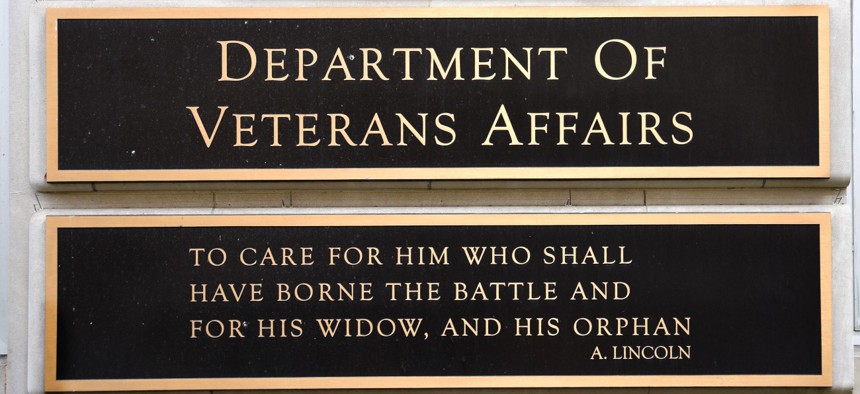
Robert Alexander/Getty Images
The VA Wants to Help Native American Vets Better Access Their Benefits
As of October 2021, there were about 160,000 American Indians/Native Hawaiians/Alaska Natives veterans nationwide, according to VA officials.
The Veterans Affairs Department wants to know how it can better help veterans from Native communities access their benefits.
The information sought is to further VA’s Tribal Representation Expansion Project, an initiative to make sure that Native American veterans have sufficient representation to prepare, present and prosecute their benefit claims to the agency. The project was listed in a report the White House released in November about the Biden administration’s efforts to better support Tribal communities. There are about 160,000 American Indians/Native Hawaiians/Alaska Natives veterans nationwide, VA said in October.
“VA has long since recognized the unique circumstances of Tribes and that cultural, geographical, or language barriers may exist that prevent or deter Native American Veterans from seeking out representation on their benefit claims before VA,” said a notice from VA published in the Federal Register on Monday. “In 2017, VA took affirmative steps to improve access to representation on Tribal land…VA, however, recognizes that there is still more that VA can do to advance equity in the access to representation for Native American veterans on their VA benefit claims.” Stars and Stripes reported in June 2019 on the “dead end” result of the changes made in 2017.
Also, in order to “further facilitate access to culturally competent representation for Native American Veterans, and to honor the unique nature of the federal government's nation-to-nation relationship with the Tribes, VA would like to collaborate with Tribal governments to expand opportunities for claims representation where needed,” said the notice.
VA would like feedback from Tribal communities on a slew of questions, which include:
- Are the Native American veterans in your area receiving any help in obtaining their VA benefit claims?
- If the veterans have access to representation for their VA benefits claims, then is this “culturally competent representation?”
- If veterans and their families are not being represented adequately, is there some in your Tribal government who could fill the need?
- Do veterans and their family members within your Tribal community face any barriers in accessing representation on their VA claim? This can include: location or language obstacles, distrust of federal/state governments and internet service challenges
- Would your Tribal government want to work with the VA to identify someone affiliated with your government to represent veterans and their families on benefits claims?
- Are there any other issues that should be addressed in order to fully support access to representation for Native American veterans?
The VA is holding a virtual tribal consultation session on March 23 then feedback on the request is due by March 30.
The Tribal Representation Expansion Project was announced on November 15 at the White House Tribal Nations Summit, VA spokesperson Gary Kunich told Government Executive.
“Native Americans serve in the military at among the highest rates, per capita, as compared to other ethnic groups,” said Kunich. “VA has heard, through anecdotal evidence, that some Native American veterans may be unaware of their potential entitlement to veterans' benefits and their right to obtain representation on their benefit claims.”
The project “is intended to promote the traditional paths of VA accreditation and to offer an additional pathway—through the general counsel’s special authority,” Kunich continued. “VA has the authority to specially authorize certain individuals, who are not otherwise accredited to practice before VA, to prepare, present, and prosecute benefit claim(s) so long as the services are provided free-of-charge and the person providing such services has been appointed by the claimant to represent on the claim before VA.”
Smithsonian Magazine published an article in November 2020 that looks at the “remarkable and complex” history of Native Americans serving in the military.
“It has been a long-held view that Native Americans have served at a higher rate in proportion to their population than any other racial or ethnic group,” said the article. “[Alexandra Harris, co-author of Why We Serve: Native Americans in the United States Armed Forces and senior editor at the Smithsonian’s National Museum of the American Indian] says that can’t be proven true or false, in part because the U.S. military itself does not keep accurate tallies…Yet Native Americans—a group that includes American Indians, Alaska Natives and Native Hawaiians—have served in U.S. conflicts since colonial times.”
The Defense Department said in a November post that 29 Native American service members (25 soldiers, three sailors and one Marine) have been awarded the Medal of Honor, which is the highest medal for valor.
Among the initiatives from the Biden administration to support Tribal nations, the VA announced in October it appointed members to its first-ever advisory committee on Tribal and Indian Affairs to advise the VA Secretary on all matters related to Indian tribes, Tribal organizations, Native Hawaiian organizations and Native American veterans.
Update: This article was updated with comment from VA at 6:45 p.m.







